election2020
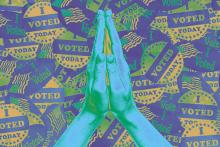
Faith communities across the U.S. are looking to help further democracy by ensuring that 100 percent of the eligible voters in their congregations turn out for the 2020 election.
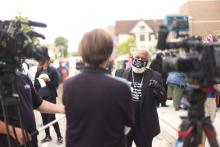
Souls to the Polls has a big vision: energizing 100,000 Milwaukee residents to vote. To get there, the nonpartisan organization educates, registers, and transports voters to polling sites in Wisconsin, a battleground state with rising COVID-19 case numbers.

As political groups across the country make their last appeals to Christian voters, often pointing to a narrow set of issues, Sister Jane Ann Slater, chancellor of the Catholic Archdiocese of San Antonio, wants the people of faith to think more broadly — looking at the total of what a candidate or ballot proposition brings to the community.
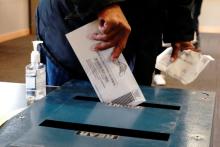
Siding with Wisconsin's Republican-led legislature, the conservative-majority U.S. Supreme Court refused on Monday to allow an extension ordered by a federal judge in the deadline for returning mail-in ballots in the state, dealing a setback to Democrats.
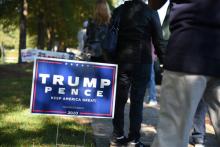
Voter intimidation — harassing voters, spreading misinformation, or asking them about their citizenship — is never allowed under federal law. And many states prohibit explicit electioneering, such as handing out pamphlets endorsing a specific candidate. But when it comes to apparel, state laws and enforcement vary.
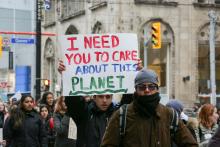
Addressing climate change is a faith-based obligation to “protect God’s creation,” say 81 percent of American religious voters surveyed in a poll released this morning from Climate Nexus and Yale and George Mason’s respective programs on climate change communications.
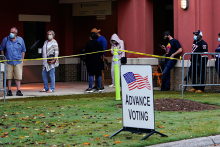
The Council on American-Islamic Relations of Minnesota has accused a private security company of violating the Voting Rights Act of 1965 by hiring ex-U.S. military Special Operations soldiers to patrol polling places. The company, Atlas Aegis, posted a job listing in early October looking for former Special Operations personnel to “[staff] security positions in Minnesota during the November Election and beyond to protect election polls.”
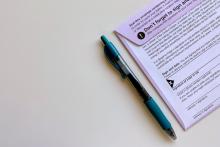
In the midst of a tumultuous election season, Christians in the United States are discerning faithful ways to engage with politics. Christian discernment involves understanding ourselves, our relationship to God, our connection to our neighbors, and our most deeply held values.
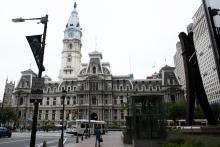
The U.S. Supreme Court on Monday allowed an extension of the deadline for mail-in absentee ballots in Pennsylvania for the Nov. 3 election, declining a Republican request to block a lower court's ruling that gave voters more time.

According to new survey data released by the Public Religion Research Institute (PRRI), 57 percent of Americans ranked fairness of presidential elections as the top critical issue in the country when asked to choose from 14 issues ranging from the COVID-19 pandemic to racial inequality.
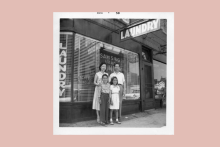
My kids are the great-granddaughters of Chinese immigrants, but until recently, I hadn’t shared much about our immigration story or been a vocal advocate for immigrant rights. Instead, like many evangelicals, I had absorbed hardline views on the subject.
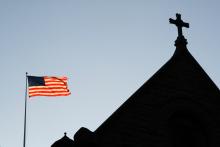
Churches have been barred from directly supporting or opposing candidates since the passage of the Johnson Amendment in 1954. But pastors can still work on the election in meaningful ways without jeopardizing their tax-exempt status, so long as they are mindful of the rules.
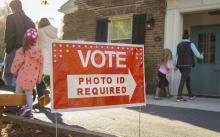
Immigration is never out of sight for those whose lives depend on it, even while it may have not been a topic of choice for presidential and vice-presidential debates this year. Candidates and lawmakers on both sides of the aisle have used the stories and experiences of immigrant people for political gain. But for many immigrant people, engaging in the larger immigration discourse and advocacy work is primarily about our families and our communities: their present reality and their future opportunities. It is not about touting a “welcoming” nature or defending a seemingly attacked territory or national identity as politicians and others have often approached it.
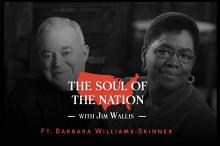
"The country is only as strong as it treats the most vulnerable citizens," Williams-Skinner says. "Right now we are a weaker country because we are robbing not just Black and brown people, but elderly people."
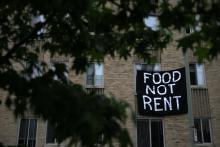
Despite our immense wealth as a country, poverty has always been a problem in the United States. It remains as an insidious legacy of slavery and systemic racism as well as an ever-present barrier in largely white rural communities and increasingly among Americans living in suburban communities.
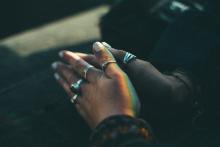
We shouldn't be surprised that an election that has come to be about race and culture is also the first in which the sitting president refuses to agree to a peaceful transfer of power. Both of us — a white Christian and a Black Christian, both evangelicals — have both been noticing how differently white people and Black people, even those on the same side of the political aisle, are talking about what we are up against.
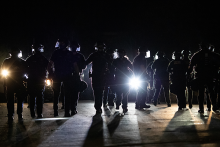
NONVIOLENT PEACEFORCE is an international nonprofit that works with communities facing violence to implement nonviolent strategies to help keep them safe. They have worked with communities around the world, including in Sri Lanka, Iraq, South Sudan, and Guatemala. Mel Duncan, Rosemary Kabaki, and Jessica Skelly of Nonviolent Peaceforce spoke in mid-September with Sojourners’ Betsy Shirley about their newest project location: the United States.
Sojourners: Why did you start projects here in the U.S. this fall?
Mel Duncan: We recognize that right now there are many indicators of looming violence, whether it be strife over police brutality and racism, or the chaos that is being stirred up around the election, or the catastrophic experiences we’re seeing with climate change—all of these can trigger violence.
What risks do you see?
Jessica Skelly: As we look toward the elections and beyond, we can see some indicators for flashpoints of violence—election tampering, delays in the election, perhaps continued police brutality, instigation by agents provocateurs—and people want to know how they can mobilize in responsible and constructive ways and help de-escalate some of that violence and protect themselves.
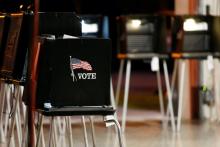
1. Get involved
Scenario: Voting places are closed, and mail-in ballots are restricted because there are too few election workers due to COVID-19 concerns.
Tip: Democracy is a team sport. Everyone can be an election worker. Commit a certain number of people from your church to register as poll workers and mobilize medical personnel to speak on coronavirus-safe voting practices. The U.S. Election Assistance Commission hosts a video explainer and training information for each state, and you can support efforts to recruit young poll workers through powerthepolls.org.
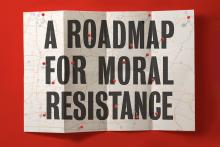
THE RIGHT TO VOTE, a foundation of our democracy and a fundamental attribute of citizenship, is under serious threat. In recent years, attacks on the integrity of the electoral system—the gutting of the Voting Rights Act, disinformation campaigns, foreign interference, and more—have weakened its overall infrastructure and cast doubt upon its results. Now we’re seeing repeated attempts, through propaganda and other means, to further undermine the system and discredit in advance the results of the 2020 election.
The president has attempted to co-opt real concerns about the upcoming election, claiming without evidence that it might be “stolen” as a result of fraud tied to vote-by-mail. His efforts deflect attention away from the ways that voter suppression efforts already underway pose a real danger, both to people seeking to exercise their hard-won right to vote and to the integrity of the electoral system itself.
As many have pointed out, there are numerous ways internal or external forces could call the results of the election into question: declaring a state of emergency that disrupts voting, delaying Election Day, interference by hostile foreign powers, tampering with voting machines or databases, and more. All of these represent legitimate threats, but perhaps the most likely scenario is that rampant voter suppression tactics impede enough voters in key battleground states to alter the presidential election outcome and which party controls Congress.

PEOPLE OFFER MANY reasons for not voting, from “one vote doesn’t matter” and “there’s no real difference between the parties” to the conviction that an election “won’t bring about real justice (or the reign of God).”
The latter, at least, is certainly true. Voting—even electing the best-available candidates for the most important positions in government—definitely won’t bring about the peaceable kingdom.
But who is ultimately elected—especially at the presidential level—can make a world of difference in the lives of those in the most vulnerable conditions. For instance, in the past three-plus years, more than 200 judges have been appointed to the bench, many of them to lifetime terms. Of that number, zero have been Black. And judicial appointment is only one of many powers in executive hands, which affect everything from education, housing, and immigration policies to whether our society makes the hard choices of confronting racialized policing and combating climate change.